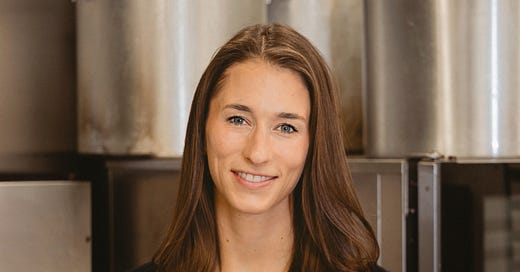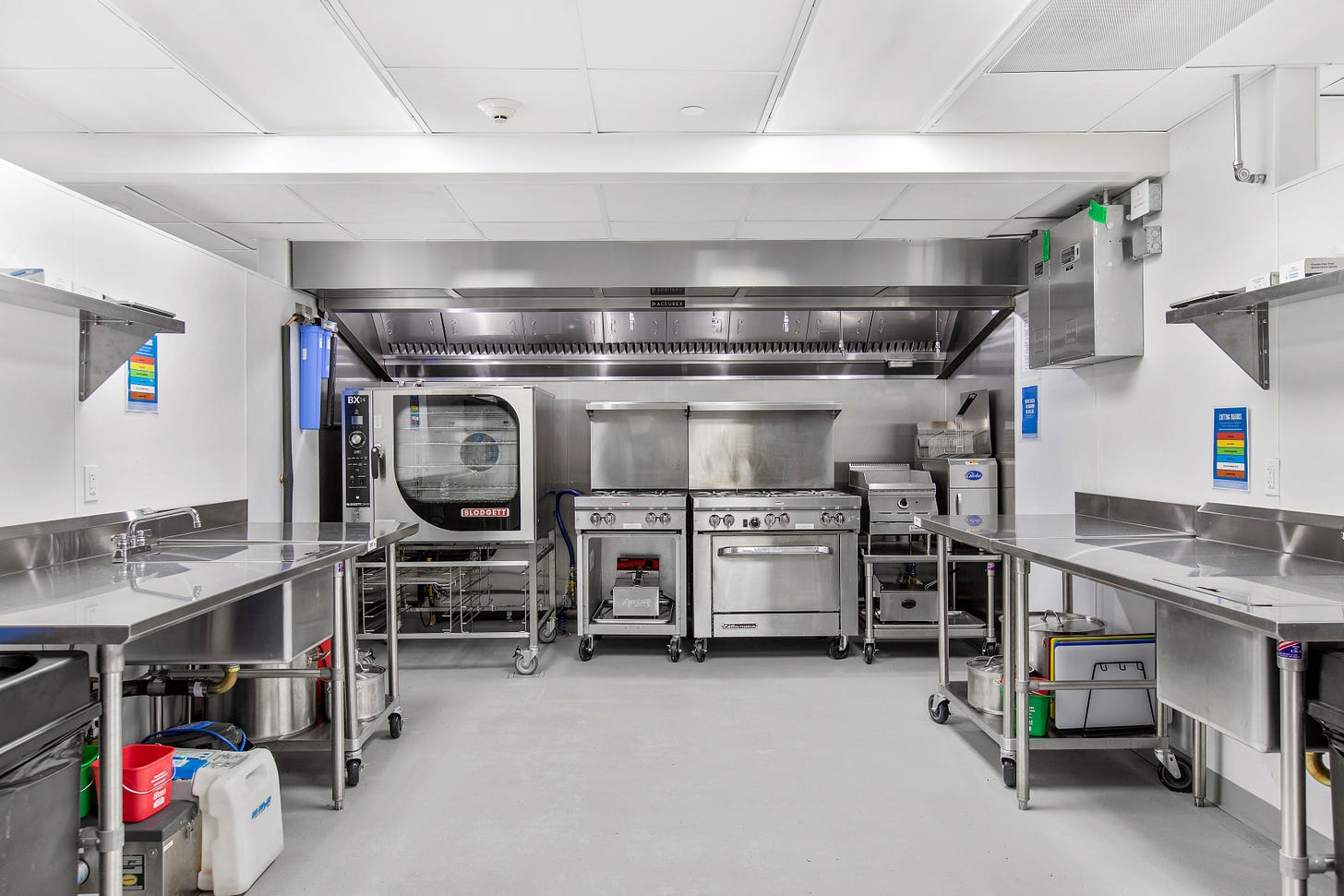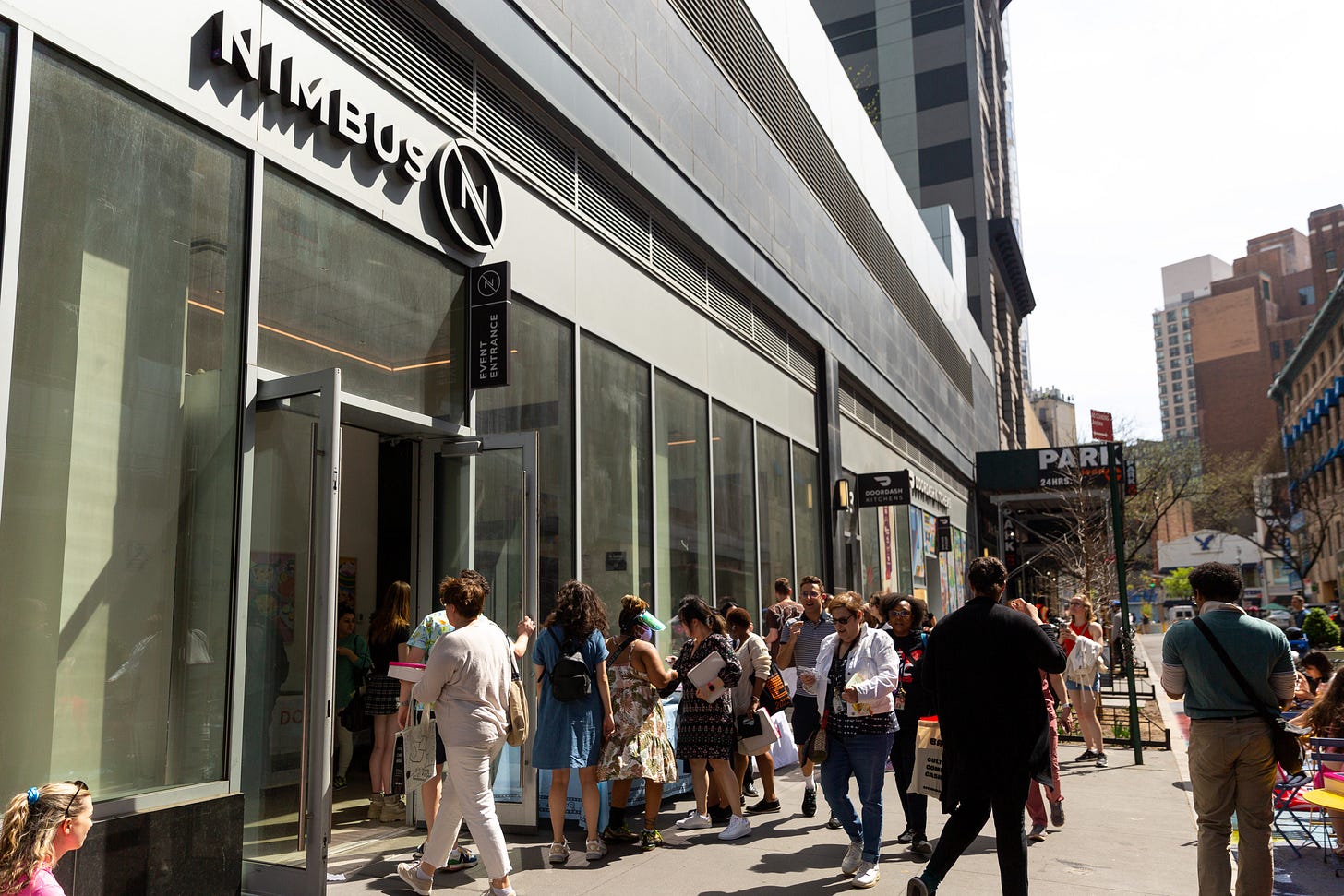Nimbus CEO Camilla Opperman's Growth Secrets
Drizly shutters, Seattle minimum wage, int'l delivery trends
Today we’ve got an exclusive interview with Camilla Opperman, Founder & CEO of Nimbus. She shares how her shared kitchen brand built its biz with DoorDash, has scaled up in NYC, and how she’s avoided the ghost kitchen' industry’s plight.
We’ve also got big pay news out of Seattle, and a sobering story for Drizly fans.
Today’s edition is brought to you by Curbivore — March 28/29 in DTLA.
Today:
Uber Shutters Drizly
Seattle’s Minimum Delivery Wage in Effect
Chart Time | Int’l Food Delivery Trends
Nimbus’ CEO Camilla Opperman Talks Growth
BOOZE | Uber To Shutter Drizly
January just got a whole lot dryer… Uber is shutting down alcohol delivery subsidiary Drizly, less than three years after acquiring it for $1.1 billion. While the booze biz boomed during Covid, with Drizly becoming North America’s largest online alcohol marketplace, Uber now wants to integrate all that activity into its core Eats marketplace, which also has a thriving beer and spirits section. Pierre-Dimitri Gore-Coty, Uber's SVP of Delivery, added “…we've decided to close the business and focus on our core Uber Eats strategy of helping consumers get almost anything — from food to groceries to alcohol — all on a single app."
The Big Picture: In some ways, Drizly was an odd duck for Uber, as it didn’t pool gig workers and dispatch them on merchants’ behalf. Instead, it built tech for liquor stores to run their own delivery services. But its biggest downfall may have been a cybersecurity breach that exposed 2.5 million customers’ info. While Drizly confirmed the hack in 2020, post-acquisition, it had known about it for two years without addressing it. That led to an FTC order in late 2022 that limited what kind of data Drizly could collect. Hamstrung by that enforcement, might Uber have decided it was easiest to go cold turkey and shutter the brand?
PARTNER | Meet Curbivore’s 2024 Launch Partners
As commerce rapidly moves to the curb, Curbivore is thrilled to announce that the community is once again gathering in person – March 28 & 29 in Downtown LA – giving you a chance to see, touch and try the technology that's reshaping our future, as well as meet with the civic leaders and forward-thinking entrepreneurs that are ensuring nobody is left behind as we reshape our delivery networks, transportation systems, cities and vital local businesses for the better. This gathering is not only a call to rethink our streets, sidewalks & civic spaces – it's a celebration of the amazing organizations making that transition possible, and a chance to sample some of the best street food in the country and kick the tires of new mobility & delivery vehicles! See the new partners or score Early Bird Tickets now.
POLICY | Seattle’s New Delivery Minimum Wage Goes Live
Delivery economics in Seattle got shaken up over the weekend, with two new laws going into effect last Saturday. App-Based Worker Paid Sick and Safe Time Ordinance (APBWPSST) requires companies to provide paid time off, while App-Based Worker Minimum Payment Ordinance (APBWMP) requires minimum payments per mileage and time. (Full text available here.) In effect, delivery apps with 250+ workers must pay 44 cents per minute and 74 cents per mile while serving an order, with a minimum pay of $5 per order. By comparison, Seattle’s standard minimum wage is $19.97 per hour at large employers, bested only by Tukwila, a neighboring suburb.
The Big Picture: The 3PDs are already responding to the law, with many no longer offering deliveries from Seattle-based businesses to customers outside city limits. Shipt has paused its service in the city completely. DoorDash, which says Dashers will make $26.40 per hour plus tips and mileage reimbursements, will be adding customer-facing fees and eliminating Top Dasher and Priority Access programs. Instacart is responding by defaulting the tip option to $0. Uber and Grubhub have also foreshadowed new customer-facing fees.
CHART TIME | International Delivery Trends
Highlighting its worldwide reach, Just Eat Takeaway.com has released its Global Food Trends Report. Overall, the findings illuminate which cuisines are trending, how brands are cutting down on packaging, which fusion cuisines are growing, the rise of quick commerce, and the impact of social media on purchasing decisions. For you geography dorks, there are also separate reports breaking down the data for Austria, Belgium, France, Germany, Italy, Netherlands, Poland, Switzerland and the U.S.
INTERVIEW | Nimbus CEO Camilla Opperman Talks Shared Kitchens
Modern Delivery: What led you to start Nimbus, and how did you get it off the ground?
Camilla Opperman: In early 2019, I was trying to launch a food business and got frustrated with the lack of viable commercial kitchen spaces in New York City. Everything I toured was either out of budget, incredibly remote and difficult to get to, or didn’t have storage or kitchen availability. Based on that experience, I decided to solve my own problem and launch a shared kitchen business. After almost a year of market research, we signed our first lease in January 2020 and had plans to start construction in March 2020; while construction was delayed due to COVID-19, we were able to open our doors in our first facility in the Lower East Side in January 2021. Since then, we’ve opened three additional kitchen locations around New York City (Downtown Brooklyn, SoHo, and Midtown) and have helped hundreds of emerging, established, and enterprise food service professionals launch, relaunch, or grow their businesses and reach thousands of new customers.
MD: Prior to founding the company, what were you doing, and do you think that in some way led you to create the current business?
CO: I ran my college’s late-night snack shack for three years, which gave me my first taste of the hospitality industry. While I didn’t go back into the industry immediately following graduation – I had a stint in supply chain operations – I always knew I wanted to get involved with food. My experience in college instilled the love of the industry in me, while my experience in supply chain operations gave me the operational mindset needed to succeed in what has proven to be a very operationally intensive business.
MD: How would you describe what Nimbus provides?
CO: Nimbus offers short- and long-term kitchen rentals with community-facing front of house spaces, digitally-enabled food halls, and event programming to provide food businesses with the infrastructure they need to launch, grow, and thrive with little risk and minimal capital commitment.
MD: What are some of the biggest differences between the commercial kitchen spaces you operate and a space more geared towards ghost kitchens?
CO: There are two key differentiators for Nimbus: our flexibility and our focus on community.
Members can cook in our kitchens for a few hours or a few years, while our competitors only offer long-term rentals. Our flexible and diverse product offering allows us to target all kinds of food businesses across business sizes and maturities — including catering businesses, bakers, CPG brands, pop-up operators, delivery concepts, and more — while our competitors only service a small subset of those food business types (namely only delivery concepts who can afford longer-term leases). Many operators begin as hourly members and grow into longer-term dedicated customers, using additional Nimbus locations to help scale. Our operational efficiency and flexibility enables Nimbus members to remain in our co-cooking ecosystem longer than typical off-premise kitchens.
We’ve also reimagined off-premise kitchens by focusing on community. Our digitally-enabled food hall in Downtown Brooklyn with on-site ordering and café seating serves as a bridge between our members and the neighborhood. Nimbus ensures that its members have multiple touchpoints with the end consumer to boost brand visibility through a variety of events such as pop-ups, tastings, cooking classes, dinner parties and more. More-so, the open floor plan of our hourly kitchens facilitate organic collaboration between members, making our offering significantly stickier than the often soulless "ghost kitchens" that have popped up around the country.
MD: Who are some of the companies that have operated out of Nimbus?
CO: Nimbus has worked with a multitude of businesses across the industry for a variety of projects. DoorDash rents kitchens from us to support delivery operations for its top-performing restaurant partners in NYC. Noma, the renowned restaurant from Copenhagen, ran a two-week pop-up in NYC and prepped all food for the event from our kitchens. OTG Management, which owns and operates airport restaurants, ran chef training from our facilities as they prepared to launch the new terminal at LGA. We also work with a number of “local hero” brands – businesses that might not yet have a national or international presence, but have made a splash in the local scene and are poised for long-term success. Some favorites include South Philly Barbacoa, Best Damn Cookies, Allie’s Banana Bread, and HappyBoards.
MD: One of your most marquee customers is DoorDash; how did you go about getting DoorDash Kitchens into your system, and what are they like to work with?
CO: Our largest and longest-standing customer, DoorDash has been part of our member base since we launched our first location in January 2021. I had no prior connection to DoorDash, and the relationship was forged as a result of my cold outreach on LinkedIn! Working with DoorDash has been an incredibly collaborative and mutually beneficial experience, with both parties contributing to the success of our co-cooking ecosystem.
MD: When you’re trying to sign on a new customer – what are the biggest value propositions that resonate with them?
CO: The flexible rental model at Nimbus has always resonated with our members. Nimbus caters to the unique needs of business operations by offering facilities for a few hours a day or full time, allowing operators to scale up or down based on demand. Now more than ever in today’s real estate market, the flexibility offered at Nimbus is significantly more attractive than a traditional lease or other shared kitchen solutions.
Our community front of house space is an incredibly valuable asset and has proven to attract new customers. Our studio kitchen and event spaces are designed specifically for in-person experiences and content production, which form the perfect platform for food businesses looking to promote the products they’ve made in our kitchens. The emphasis on community engagement, events, and transparency with consumers sets Nimbus apart and creates valuable touchpoints for brand visibility and customer connection.
MD: What kind of policy changes would you like to see that would allow more food businesses to thrive?
CO: Starting and growing a food business in New York City is incredibly difficult. Nimbus helps reduce barriers to entry by providing the physical infrastructure for these food businesses to operate. We’d like to see policy changes that align with our goal of providing more support for small food businesses, more subsidies for shared kitchen usage, and more updated food safety regulations that account for the rise of off-premise kitchens.
MD: What are some unexpected developments you’ve encountered while scaling the company?
CO: I’ve always known that the hospitality industry is tight-knit, and that community would play a role in our business, but I’ve been surprised by the depth and extent of the community’s impact. We’ve had members do product collaborations, co-host events, exchange recipes, share labor, and generally be there to support one another. The Nimbus community is more than just a network, it's a dynamic platform where members engage in mutually beneficial activities, fostering an environment that transcends conventional business norms.
MD: Can we expect to see some new locations in the near future?
CO: We are always exploring opportunities to expand our footprint and better serve our members. While we don’t have any specific announcements at the moment, we’re looking forward to expanding in additional markets in the years to come.
MD: Any final thoughts, or advice to other folks in the space?
CO: While growth is essential to survival, greatness is not built overnight. Far too often we’ve seen four-wall businesses across various industries enter new markets too quickly, straining operational capabilities and compromising service quality, which ultimately causes locations to fail. Four-wall businesses require significant CapEx, so opening locations without understanding the nuances of local regulations and customer preferences can prove incredibly costly.
My advice is to move as quickly as possible without compromising quality. We’ve taken a measured approach to growth, focusing on establishing a strong New York City presence before considering growth in other markets, which has allowed us to hone our operating playbook and give us confidence as we enter new markets.
A Few Good Links
Domino’s U.K. & Ireland starts 3PD service on Uber Eats. LA, PGH, DC, SaMo, OAK, PDX, Louisville and MDC team up to fight delivery pollution. FedEx targets Amazon merchants with fdx: new end-to-end ecommerce solution. Kroger and MidOcean back CPG upstarts. DJI launches FlyCart 30 delivery drone. Red Lobster owner Thai Union wants out. Subway worried about CA min wage. Burger King parent co swallows largest franchisee. More c-store pizza. Pizza Hut gets new CTO. FedEx warns of weather delays. US Food drivers strike. Drive-thrus get new tech. Instacart feeds military relocatees. Uber Eats delivers Taco Bell cereal.
Got a tip, feedback, or just want to say hi? Reply back to this email.









